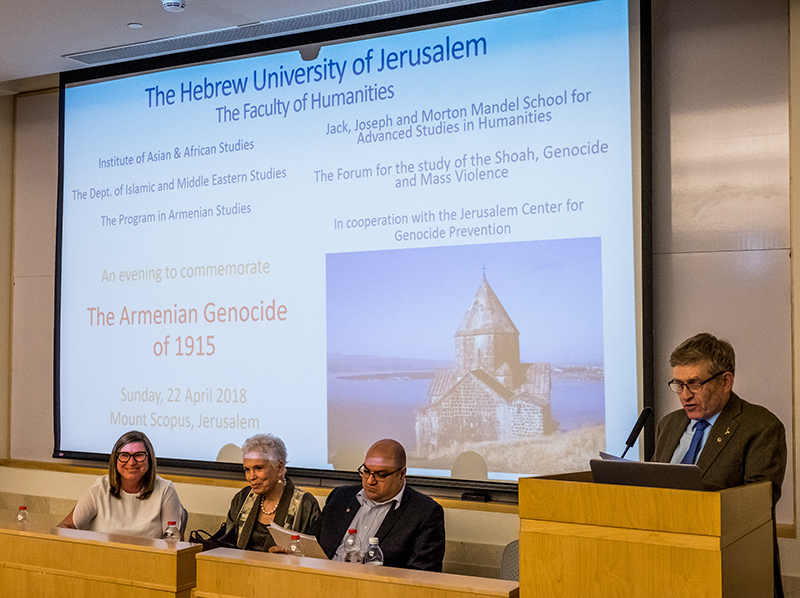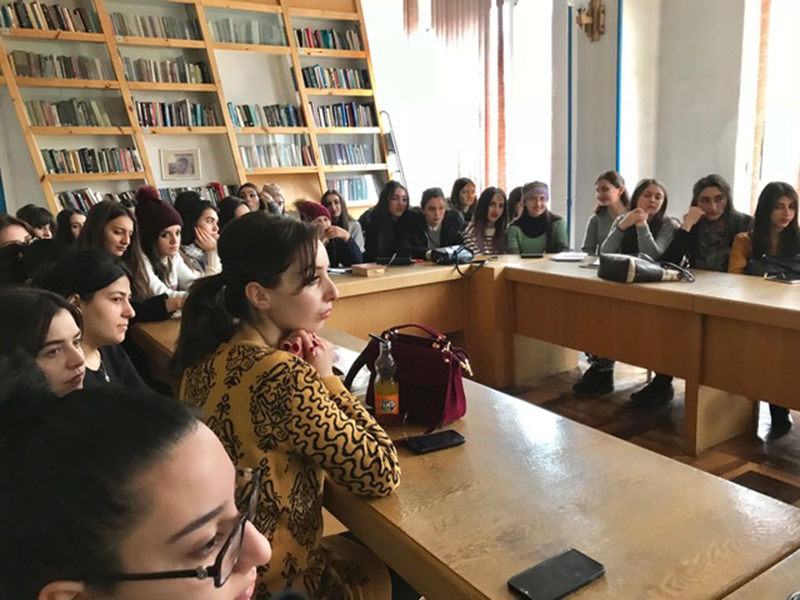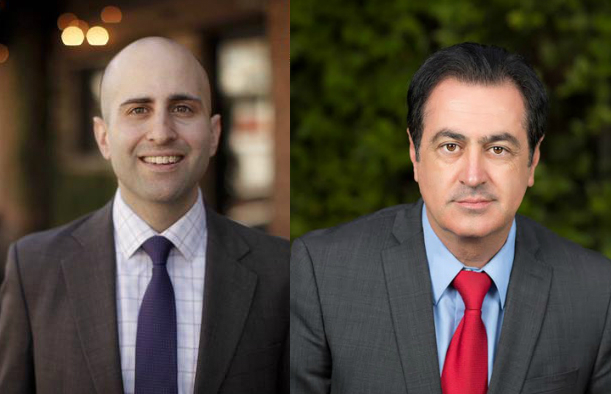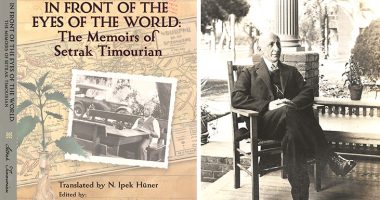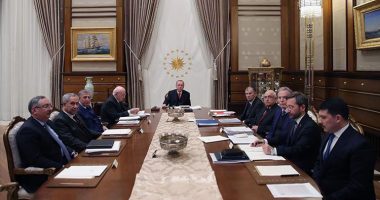JERUSALEM — On Sunday evening, 22 April 2018, the annual commemoration of the genocide against the Armenian people by the Ottoman Empire was held at the Mt. Scopus campus of the Hebrew University of Jerusalem. Close to a hundred people – students, teachers, members of Armenian community of Jerusalem and the general public – attended the evening held at the Jack, Joseph and Morten Mandel School for the Advanced Studies in the Humanities that co-sponsored the event, which included greetings from distinguished persons, three short lectures, readings in Armenian, Hebrew and English, and renditions of Armenian vocal and instrumental music.
In 1915, the systematic and extensive killings of Armenians throughout the Ottoman Empire commenced, especially in eastern Anatolia, leading to some 1.5 million deaths, and the expulsion and fleeing of many hundreds of thousands more. The purpose of the evening was firstly to remember the victims and to honor the survivors of these terrible deeds. At the same time, the government of the State of Israel was called upon to recognize these events as a genocide, and to join with other nations and international bodies to convince the Republic of Turkey – the successor to the Ottoman Empire – to take responsibility and to make atonement for the actions of over a century ago.
This year the Commemoration Evening was devoted to inaugurating the publication of the first Hebrew translation of the book by Henry Morgenthau, Ambassador Morgenthau’s Story: A Personal Account of the Armenian Genocide (Pardes Press, Haifa), a fundamental source on the events of 1915. Three speakers delivered short lectures regarding aspects of the book and its significance: Prof. Bedross Der Matossian (University of Nebraska-Lincoln and President of the Society for Armenian Studies); Dr. Pamela Steiner (Harvard University, and great granddaughter of Henry Morgenthau);and Dr. Ruth Amir (Yezreel Valley College).
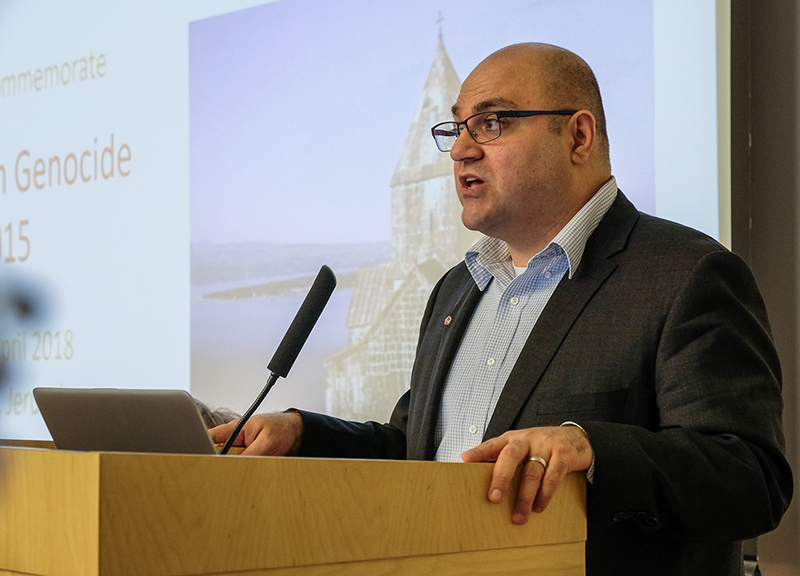

Prof. Der Matossian, a native of Jerusalem, reviewed the great public and moral achievement of the Jewish American ambassador to the Ottoman Empire: “Morgenthau’s memoir is an indisputable testimony to ‘The Murder of a Nation.’ From the American Embassy in Constantinople, he worked relentlessly to reveal these crimes and to pressure the U.S. government to intervene with the aim of saving the survivors of the Armenian Genocide. This monumental task seemed impossible at a time when the U.S. was firmly committed to isolationism and neutrality in its foreign policy. This situation required a difficult balance between the strong moral obligation Morgenthau possessed regarding the suffering Armenians and his defined role in representing his country. In the end, he chose to go beyond the limits of U.S. policy to reveal the horrors of the Armenian Genocide. As such, Morgenthau’s interventionist steps concerning the fate of the Armenians should be applauded as a heroic act.”
Because Prof. Der Matossian spoke of Morgenthau’s commitments to Armenian survival, Dr. Steiner addressed Morgenthau’s other commitments as well. She also noted that “he had enabled the survival of Jews in Palestine [during World War I],” although was not a supporter of Zionism at the time, convinced as he was “that the Arab inhabitants of Palestine would not be welcoming.” In reviewing Morgenthau’s various exertions on behalf of Armenians, Jews in Palestine, and ethnic Greek refugees from Turkey, she summed up his record by saying “he was a principled, strategic, humanitarian, and non-nationalist political actor.” Her remarks ended by noting that “Morgenthau’s anguished witness of the Ottomans’ treatment of Armenians would have led him today to side with the rule of law, human rights, democracy, and decency: to acknowledge and memorialize the Armenian genocide,” and to support Israel but “denounce Israel’s treatment of Palestinians.”
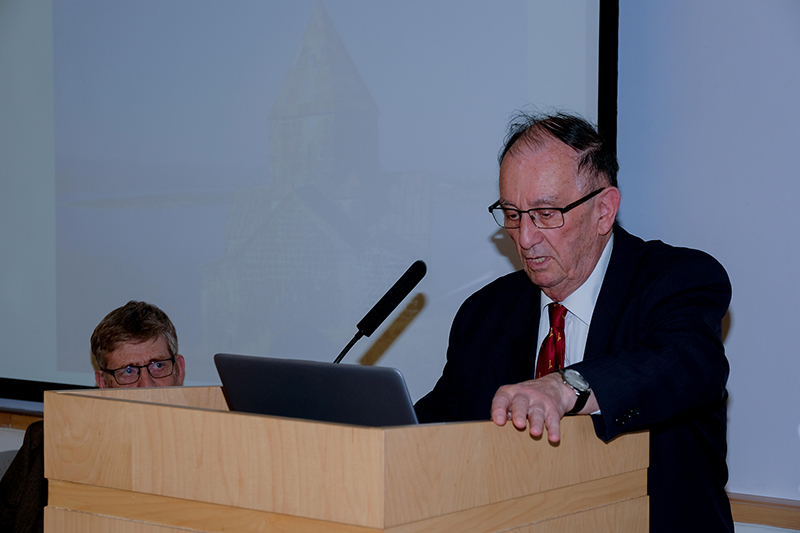

Dr. Amir also made a connection between the Armenian genocide and contemporary concerns: “Forcible transfers of women and children were a recurrent phenomenon in the twentieth century genocides and mass atrocities, including the Syrian mass violence unfolding before our eyes for seven years. Whereas the [aftermath of the] Armenian genocide marks the birth of modern humanitarianism, and the onset of the duty to protect children in international law, one cannot but notice how overdue and protracted these efforts were, how callous were countries that while condemning the perpetrators in the name of human rights, were reluctant to allow women and orphaned children in their countries for family unification.”
Greetings from the Armenian Patriarch, His Beatitude Archbishop Nourhan Manougian, were conveyed by Reverend Father Samuel Aghoyan, and a translation of a letter from Mrs. Hranush Hagopyan, Minister of the Diaspora of the Republic of Armenia sent especially for the evening, was read. Honorary Consul of the Republic of Armenia in Jerusalem, Mr Tsolag Momjian, greeted the audience, as did Prof. Dror Wahrman, the Dean of the Faculty of Humanities at the Hebrew University.
The evening was accompanied by the reading of inspiring poems in Hebrew, Armenian and English (read by Prof. Michael Stone and Yoav Loeff), as well as Hebrew and Armenian versions of the evocative “The Vision of the Dry Bones” from the book of Ezekiel (read by Adv. Kavork Naldandian and Dr. Yakir Paz respectively). Well-known Armenian songs were beautifully rendered by an ensemble of young women from the St. Tarkmanchatz Armenian School in Jerusalem, and evocative folk songs were by played the local Dilijan Duo. The continuity and thriving of Armenian life and culture until today was thus emphasized, ending the evening on a hopeful tone.
The Commemorative Evening was organized by the Program of Armenian Studies at the Hebrew University, part of the Faculty of Humanities. Besides the Mandel School for Advanced Studies in the Humanities (under the academic direction of Prof. Israel Yuval), other co-sponsoring bodies were the Forum for the Study of Shoah, Genocide and Mass Violence at the Hebrew University (coordinated by Prof. Amos Goldberg) and the Jerusalem Center for the Prevention of Genocide, a registered association led by Prof. Elihu Richter. Prof. Reuven Amitai, academic coordinator of the Armenian Studies program, chaired the evening.
The Armenian Studies Program at the Hebrew University of Jerusalem has been undergoing a process of rejuvenation in the last couple of years, and is now part of the Department of Middle Eastern Studies. Every year we offer an “Introduction to Armenian History and Culture,” taught by Yoav Loeff, in which some 35-40 students participate on the average. For several years now, an advanced reading course in Classical Armenian meets weekly under the aegis of Prof. Michael Stone. A Guest Professor is hosted annually: last year it was Prof. James Russell (Harvard); this current year it will be Prof. Theo M. van Lint (Oxford), and Dr. Jasmine Dum-Tragut (Salzburg) will be visiting as part of the Erasmus+ (EU) faculty exchange. Also planned are an “Armenian Culture Day” and the especially important annual Commemoration of the Armenian Genocide. Prof. Reuven Amitai, former dean of the Faculty of Humanities, is now coordinating the Program.

